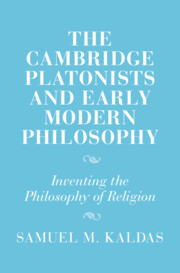Book contents
- The Cambridge Platonists and Early Modern Philosophy
- Cambridge Studies in Religion and Platonism
- The Cambridge Platonists and Early Modern Philosophy
- Copyright page
- Dedication
- Contents
- Acknowledgements
- Note on the Text
- Abbreviations
- Introduction: The Cambridge Platonists and Philosophy of Religion
- Part I The Origins of Cambridge Platonism
- 1 Learned and Ingenious Men
- 2 ‘Plato and His Scholars’:
- 3 Puritanism and Predestination
- 4 Cambridge Platonists versus Cambridge Calvinists:
- Part II Rival Conceptions of God and Goodness:
- Part III The Religious Epistemology of the Cambridge Platonists
- Conclusion: The Cambridge Platonists as Early Modern Christian Platonists
- References
- Index
2 - ‘Plato and His Scholars’:
Early Cambridge Platonism
from Part I - The Origins of Cambridge Platonism
Published online by Cambridge University Press: 09 May 2024
- The Cambridge Platonists and Early Modern Philosophy
- Cambridge Studies in Religion and Platonism
- The Cambridge Platonists and Early Modern Philosophy
- Copyright page
- Dedication
- Contents
- Acknowledgements
- Note on the Text
- Abbreviations
- Introduction: The Cambridge Platonists and Philosophy of Religion
- Part I The Origins of Cambridge Platonism
- 1 Learned and Ingenious Men
- 2 ‘Plato and His Scholars’:
- 3 Puritanism and Predestination
- 4 Cambridge Platonists versus Cambridge Calvinists:
- Part II Rival Conceptions of God and Goodness:
- Part III The Religious Epistemology of the Cambridge Platonists
- Conclusion: The Cambridge Platonists as Early Modern Christian Platonists
- References
- Index
Summary
This chapter considers whether and in what way Whichcote, More, Cudworth and Smith can be called ‘Platonists’. Was Platonism a part of the story they told about themselves, or that their contemporaries told about them, or is it simply an anachronistic label invented by modern scholarship? I argue that ‘Platonism’ was a live intellectual category in the Cambridge Platonists’ seventeenth-century philosophical and theological context and denoted a particular set of doctrinal positions which were associated with ancient Platonism, such as the primacy of God’s goodness over his will. The chapter also investigates evidence of a surge of interest in ancient and Renaissance Platonism at Cambridge in the latter half of the 1630s, centred at Emmanuel College, which included John Sadler, Peter Sterry and Laurence Sarson and also coincides with Henry More’s discovery of Platonism, and Cudworth’s early Platonic letters to John Stoughton. It is argued that these developments provide important context for the origins of Cambridge Platonism, and illuminate the ways in which Whichcote, More, Cudworth and Smith’s intellectual development was shaped by engagement with Platonic texts and ideas.
Keywords
- Type
- Chapter
- Information
- The Cambridge Platonists and Early Modern PhilosophyInventing the Philosophy of Religion, pp. 30 - 60Publisher: Cambridge University PressPrint publication year: 2024

